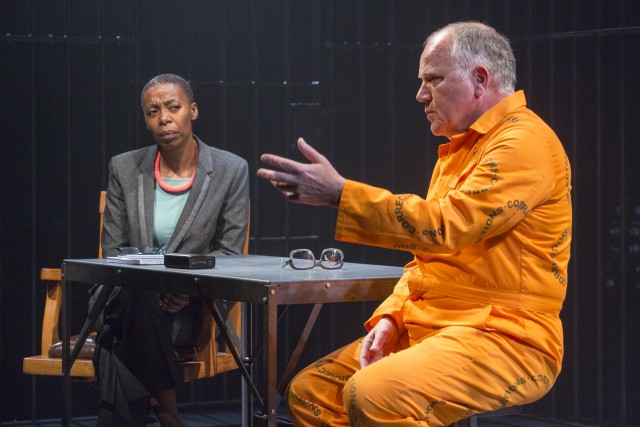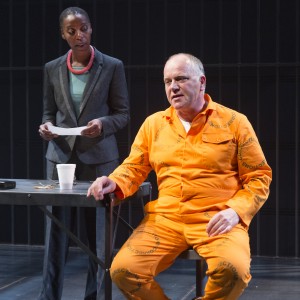
Pumla Gobodo-Madikizela (Noma Dumezweni) and Eugene de Kock (Matthew Marsh) discuss violence and murder, forgiveness and reconciliation in A HUMAN BEING DIED THAT NIGHT (photo by Richard Termine)
BAM Fisher, Fishman Space
321 Ashland Pl.
Tuesday-Sunday through June 21, $65
718-636-4100
www.bam.org
Near the beginning of Nicholas Wright’s sharp, powerful A Human Being Died That Night, inmate Eugene de Kock (Matthew Marsh) asks psychologist Pumla Gobodo-Madikizela (Noma Dumezweni), “Does this set-up that you’re looking at now make you think of a certain film?” It’s a question meant for the audience too, who are thinking the same thing as de Kock continues, “With Jodie Foster and Sir Anthony Hopkins? . . . Well, that’s what they think I am.” Set in a prison where de Kock is serving two life sentences plus 212 years for committing political crimes against black South Africans, earning the nickname “Prime Evil” for his involvement in numerous cold-blooded murders, A Human Being Died That Night instantly recalls Jonathan Demme’s The Silence of the Lambs; Marsh’s erudite manner as de Kock even mimics Hopkins’s portrayal of Hannibal the Cannibal. But there are two primary differences: First, de Kock is a real person, and his story is true. Second, where the fictional Hannibal Lecter reveled in his deeds, de Kock is exploring forgiveness and repentance. Based on Gobodo-Madikizela’s book, which details her meetings with de Kock in Pretoria Central Prison, the play takes place inside a prison cell (designed by Paul Wills), with Gobodo-Madikizela, who served on Nelson Mandela’s Truth and Reconciliation Commission, on one side of a rectangular table, de Kock, in leg irons that limit his movement, on the other. Over the course of eighty minutes, they discuss the nature of his killings, which included a public bombing, his victims and their families, and his fellow policemen, particularly his superiors, who gave him his orders but have paid no consequences. Gobodo-Madikizela is not interviewing de Kock in an official capacity but for her own personal and professional studies, although she does not want to get too close to him. “There’s a line that I don’t want to cross,” she explains, to which he responds, “You want to understand me, but you don’t want to cross a line? Isn’t that making things unnecessarily difficult for yourself?” But she is shocked when she suddenly does cross that line, leading the way to deeply intimate revelations.
Originally staged by Cape Town’s Fugard Theatre, A Human Being Died That Night is a riveting exploration of forgiveness and reconciliation. Olivier Award winner Dumezweni (A Raisin in the Sun, The Bogus Woman) and Marsh (Proof, The Last of the Haussmans) are mesmerizing as their characters warm to each other and reach unforeseen conclusions. Director Jonathan Munby, a veteran of many a Shakespeare production at theaters around the world, maintains a tense calm throughout that is heightened by a moment that frightens Gobodo-Madikizela; meanwhile, the sound of de Kock’s rattling chains are occasionally heard, a reminder of what he has done, even as he speaks eloquently about what’s in his heart. In the latter part of the play, the two characters switch sides of the table, de Kock no longer tethered to his spot, as if each is now in the other’s shoes, offering a different perspective on what comes next. Haunting and harrowing yet with a gentle soul, A Human Being Died That Night is especially relevant given America’s reaction to the Boston Marathon bomber, with calls for his execution coming from even those who are usually against the death penalty. Meanwhile, in January of this year, de Kock was granted parole. The play will have you looking inside yourself, examining your own views on forgiveness and reconciliation, empathy and compassion, and the nature of good and evil, whether in relation to a mass murderer or a more personal and private matter. And you might be surprised what you learn about yourself.
